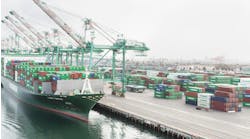Cutting Excess Government Spend with Outsourced Procurement
Chief Procurement Officers (CPOs) in the public sector are tasked with the same responsibility as almost any private sector procurement executive: find ways to cut costs. As part of this effort, CPOs must stop treading water and think outside of their own organizations.
The Deloitte Global CPO Survey 2014 found that 30% of CPOs want to increase outsourcing of operational buying, and that 46% said switching to outsourced delivery has been effective at reducing operating costs. But the evolution of procurement departments from purely tactical buying (for example, approving purchase orders and negotiating contracts) to outsourcing and strategic saving takes time and baby steps.
This journey generally starts with centralizing procurement processes across an organization, then eventually granting buyers the opportunity to hone and differentiate their skill sets and expertise. Only when an agency has developed strong internal processes can truly efficient procurement outsourcing happen.
Transitioning to an outsourced model can be particularly challenging for security and compliance-sensitive government agencies, but if approached correctly, it can reduce short-term purchasing costs and make procurement a vital part of long-term planning.
Overcoming Internal Chaos
CPOs might be tempted by outsourcing's potential to reduce procurement costs immediately, but recruiting external help can't be an impulse decision. Outsourcing won't solve internal dysfunction; it requires that agencies have a clear understanding of both their current and ideal procurement process first.
Without a grasp on what role third-party procurement will play within the organization—and how internal operations can retool to take on more critical projects—outside assistance is more likely to prove a hindrance than a benefit. Adding to the confusion, many public agencies are forced to coordinate procurement activities across organizations. This often results in a failure to adhere to established vendor partnerships, pricing guidelines, and other regulations. If an agency doesn’t have a well-defined method to outsource, its vague and continually changing expectations may actually increase procurement spend.
For the public sector, this can be a tricky proposition. CPOs must seek ways to outsource routine procurement operations without ceding important internal controls and accountability. A procurement function's evolution doesn't move two ways. Bringing in subcontractors early on won't magically help staff graduate from tactical purchasing. Instead, organizations should shift to an outsourced model after the procurement function has reached a certain degree of maturity and understands exactly what it expects of its partners.
Benefitting from Outside Expertise
Many agencies need their procurement professionals to make informed decisions about complex purchases. For common yet specialized items (for example, cell phone contracts), this can easily devolve into hours spent comparing roaming and international restrictions, device specifications, and data plans among competing vendors. Outsourced procurement providers can help CPOs streamline specialty buying and avoid the financial burden of hiring a new subject-matter expert.
External procurement providers have dedicated specialists to handle these contracts and supplier relationships, ensuring that in-house teams waste less time researching technical minutiae. Especially for public agencies, outsourcing niche service or producsupplt purchasing can minimize costs without bearing significant risk.
Smarter Cost Avoidance
The lower cost of outsourced procurement operations only represents a fraction of an organization’s potential savings. With internal team members free to focus on more strategic goals, CPOs can begin to move past maintaining supply and instead preemptively manage their agencies' demand. Effective procurement goes beyond simply locating the most cost-efficient supplier for a part; it considers all factors that contribute to acquisition expenses. By influencing the demand for spend and avoiding last minute-requests when possible, CPOs can help their organizations become more agile all around.
Serious efforts toward demand planning must begin with more tightly integrating procurement with the rest of the organization. CPOs should work with the rest of the C-suite to understand resource demands across their agencies. With better awareness of the agency's needs and initiatives, procurement officers can train managers and project leaders to align resources with cost-conscious procurement strategies—and mitigate unplanned spending.
Outsourcing plays an important role in a lean procurement strategy, and is proving to be the antidote to excess spending in both the public and private sectors. But for public agencies to realize the full benefits outsourcing can bring, they must iron out inconsistencies in their own procurement processes. At the same time, closer collaboration with the executive suite is necessary to help procurement teams shed their tactical reputation. External procurement providers can be invaluable help to government organizations, so long as those organizations know how to help themselves first.









